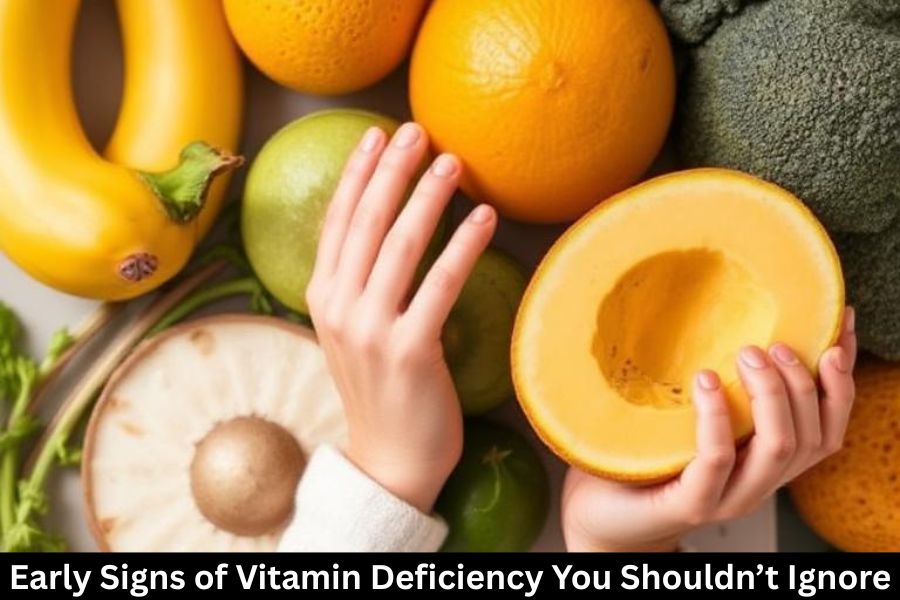You might think vitamin deficiencies are rare, but they’re surprisingly common—even in people who believe they eat “pretty healthy.” Modern diets, stress, processed foods, and environmental factors often prevent us from getting the nutrients our bodies crave.
The Importance of Recognizing Early Symptoms
Your body whispers before it screams. Early signs of deficiency can be subtle, but catching them early can prevent serious health issues down the line.
Understanding Vitamin Deficiencies
What Causes Vitamin Deficiencies?
Everything from poor diet and digestive issues to medication use and chronic stress can impact how your body absorbs vitamins.
How the Body Uses Vitamins
Vitamins act as tiny helpers, supporting everything from energy production to immune function. When even one is lacking, you can feel the effects.
Water-Soluble vs. Fat-Soluble Vitamins
Water-soluble vitamins (like vitamin C and B-complex) are used quickly and not stored, while fat-soluble vitamins (A, D, E, K) stay in the body longer. This is why deficiencies in water-soluble vitamins may appear faster.
Early Signs of Vitamin A Deficiency
Dry Eyes and Night Blindness
Struggling to see in low light? Vitamin A plays a key role in eye health, and night blindness is often one of the first signs you’re lacking it.
Skin Problems and Slow Healing
Dry, rough skin and slow wound healing can also signal a vitamin A shortage.
Early Signs of Vitamin B Deficiencies
Fatigue and Weakness
Feeling drained all the time? B vitamins help convert food into energy, so deficiencies often lead to exhaustion.
Tingling Sensation in Hands and Feet
If you feel pins-and-needles sensations, it may be linked to low B12 or B6.
Mood Changes and Brain Fog
Anxiety, irritability, or difficulty concentrating often show up when your body lacks essential B vitamins.
Early Signs of Vitamin C Deficiency
Frequent Illness
Vitamin C boosts immunity, so low levels make you more likely to catch colds or infections.
Bleeding Gums and Slow Wound Healing
If your gums bleed easily or cuts take longer to heal, your body may be signaling a need for more vitamin C.
Early Signs of Vitamin D Deficiency
Bone Pain and Muscle Weakness
Vitamin D helps maintain strong bones. Low levels can cause aches or even frequent injuries.
Low Mood and Fatigue
Feeling down? Vitamin D supports mental well-being, and deficiency is linked to low mood and depression-like symptoms.
Early Signs of Vitamin E Deficiency
Vision Problems
Vitamin E protects your eyes from oxidative damage, so low levels may affect your vision.
Muscle Weakness and Poor Coordination
Deficiency can impact the nervous system, causing weakness and coordination problems.
Early Signs of Vitamin K Deficiency
Easy Bruising
If you bruise easily, your blood clotting function may be compromised.
Excessive Bleeding
Vitamin K plays a major role in clotting, so deficiency can cause frequent nosebleeds or prolonged bleeding from small cuts.
Who Is Most at Risk of Vitamin Deficiency?
Older Adults
Aging causes decreased nutrient absorption, making deficiencies more common.
Vegans and Vegetarians
Certain nutrients, like B12, are harder to get from plant-based diets.
People With Digestive Disorders
Conditions like IBS, Crohn’s disease, or celiac disease affect how your body absorbs nutrients.
Natural Ways to Correct Vitamin Deficiencies
Diet Changes
Fruits, vegetables, lean protein, nuts, seeds, and whole grains should be the foundation of your diet.
Safe Supplement Use
Supplements can help, but they should fill gaps—not replace meals.
Importance of Professional Guidance
A simple blood test from your doctor can pinpoint what you’re lacking and how much you need.
Prevention Tips
Balanced Nutrition
Colorful plates = better nutrition. Eating a variety of foods supports long-term health.
Regular Checkups
Routine blood work can catch deficiencies before symptoms appear.
When to See a Doctor
Persistent Symptoms
If symptoms don’t improve after dietary changes, it’s time to get checked.
Serious Deficiency Warning Signs
Severe fatigue, rapid weight loss, or neurological symptoms should never be ignored.
Conclusion
Vitamin deficiencies don’t happen overnight—your body gives you hints. Paying attention to early signs like fatigue, mood changes, and slow healing can save you from more serious health problems down the road. With a balanced diet, proper supplements, and professional guidance, you can keep your body well-nourished and running smoothly.
FAQs
1. What is the most common vitamin deficiency?
Vitamin D deficiency is one of the most common worldwide.
2. Can vitamin deficiencies cause anxiety?
Yes, especially deficiencies in B vitamins and vitamin D.
3. How long does it take to fix a vitamin deficiency?
It varies, but many people notice improvements within weeks of treatment.
4. What’s the best way to know if I’m deficient?
A blood test is the most accurate method.
5. Can I get all vitamins through food alone?
Most people can, but some may need supplements depending on lifestyle, diet, and health conditions.

